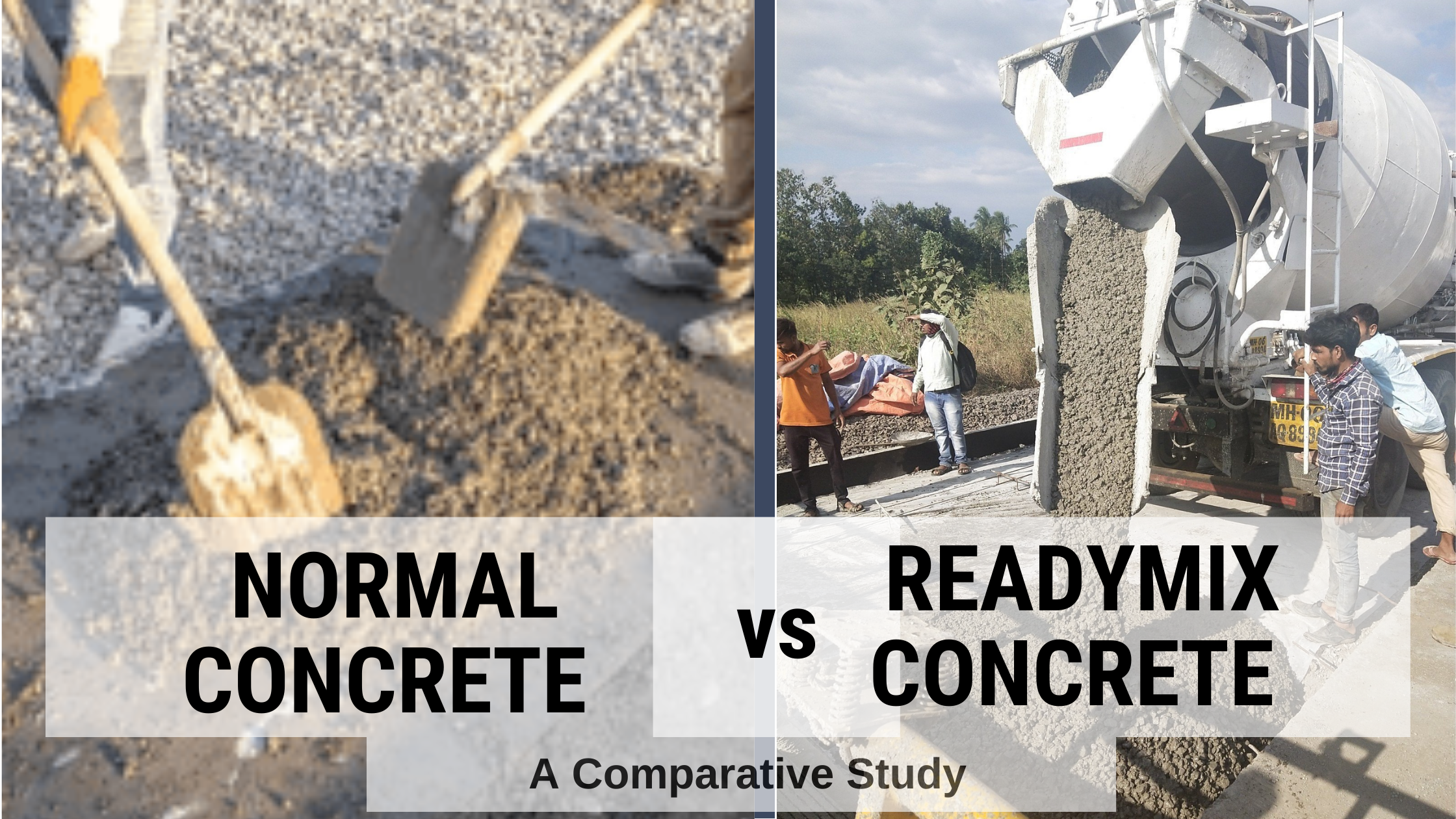A Comparative Study: Normal Concrete vs Ready Mix Concrete
Concrete plays a crucial role in modern construction, and understanding the differences between normal concrete (site-mixed concrete) and ready mix concrete (RMC) can help in choosing the best option for a project. Below, we compare both based on several key parameters, providing a verdict on which type excels in each category.
1. Preparation Process
Normal Concrete: Mixed manually or using a portable mixer on-site, normal concrete requires raw materials like cement, aggregates, and water. The mixing process can be labour-intensive and time-consuming. Know more about PCC and RCC.
Ready Mix Concrete (RMC): Prepared at a batching plant under controlled conditions. RMC is delivered pre-mixed to the construction site in transit mixers.
Verdict: Normal Concrete is labour-intensive and less efficient for large projects, but offers flexibility when resources are limited. However Ready Mix Concrete wins for consistency and efficiency in preparation, especially for large-scale projects.
2. Consistency and Quality Control
Normal Concrete: The quality and consistency of normal concrete can vary based on the skills of the labour and mixing techniques. There’s a higher chance of inconsistency in mix proportions, potentially affecting strength and durability.
Verdict: Ready Mix Concrete is the clear winner for consistent quality, thanks to the controlled mixing environment at the batching plant.
3. Cost Considerations
Normal Concrete: Normal concrete is generally cheaper due to the lack of transportation and pre-mixing costs. However, inefficiencies, material wastage, and potential quality issues can increase overall costs in the long run.
Ready Mix Concrete (RMC): The higher upfront costs of RMC come from transportation, batching, and delivery. Despite the higher price, RMC reduces wastage and minimizes labour costs on-site, leading to better overall project efficiency.
Verdict: Normal Concrete may be more cost-effective in small projects, but the potential for higher long-term costs makes RMC more economical for large-scale projects. Ready Mix Concrete is more expensive upfront. However it provides value for large-scale or quality-sensitive projects where wastage and labour costs can be minimized.
4. Time Efficiency
Normal Concrete: Mixing concrete on-site is time-consuming, especially for larger projects. Delays in mixing, labour shortages, or bad weather can extend project timelines.
Verdict: Ready Mix Concrete is far more time-efficient, as it is pre-mixed and ready for immediate use, reducing construction time significantly.
5. Labor and Equipment Requirements
Normal Concrete: Requires skilled labour for mixing and supervision. It also requires mixers, space for storage of raw materials, and more time for mixing.
Ready Mix Concrete (RMC): Needs no on-site mixing labour or additional equipment like concrete mixers. The only requirement is for workers to handle the placement of concrete.
Verdict: Normal Concrete demands higher labour and equipment, making it less ideal for large-scale projects. Ready Mix Concrete requires fewer labour resources, making it more suitable for projects where labour efficiency is important.
6. Applications
Normal Concrete: Best suited for small projects or areas where ready-mix transportation is not feasible. It’s commonly used in residential construction where only limited quantities of concrete are required.
Ready Mix Concrete (RMC): Perfect for large-scale commercial and industrial projects, including multi-story buildings, bridges, and highways, due to the volume and quality consistency required.
Verdict: Normal Concrete is ideal for small-scale or DIY projects which does not require large volumes of concrete. Ready Mix Concrete excels in large and high-volume projects where quality and time are critical.
7. Environmental Impact
Normal Concrete: The potential for material wastage and the high energy cost of transporting raw materials to the site increases the environmental footprint. Additionally, improper disposal of leftover concrete can lead to pollution.
Ready Mix Concrete (RMC): More environmentally sustainable because precise quantities are mixed, reducing waste. Many RMC plants also recycle leftover concrete, contributing to more eco-friendly practices.
Verdict: Ready Mix Concrete is more environmentally friendly due to minimal wastage and the use of sustainable batching practices in modern plants. Ready Mix Concrete has a lower environmental impact, particularly with advances in recycling and sustainability.
8. Transportation and Delivery
Normal Concrete: Since it’s mixed on-site, there’s no issue with transport costs. However, raw materials need to be delivered to the site. Delays in transportation of raw materials can disrupt the project timeline.
Ready Mix Concrete (RMC): Concrete must be transported from the batching plant, and timing is critical to avoid setting before use. Long transport distances or delays could lead to hardened concrete in the transit mixer.
Verdict: Normal Concrete is more flexible for small-scale sites, but delivery delays can be a concern for larger or more time-sensitive projects. Ready Mix Concrete is less flexible regarding transport time but offers convenience when delivery timing aligns with construction needs.
Verdict – Normal Concrete vs Ready Mix concrete
Normal Concrete: Ideal for smaller-scale projects with limited budgets, flexible timelines, and fewer quality requirements. It’s a more labour-intensive process and may not be suitable for larger projects where efficiency and quality are paramount.
Ready Mix Concrete (RMC): Best suited for large-scale, commercial, or industrial projects where time efficiency, consistency, and quality control are critical. Though more expensive initially, its benefits in terms of reduced wastage, labour costs, and construction time make it the superior choice for high-volume or complex projects.
In general, while comparing normal concrete vs ready mix concrete, RMC is the more efficient and reliable option for large-scale and quality-sensitive projects, while Normal Concrete is more suitable for smaller, more flexible applications.


